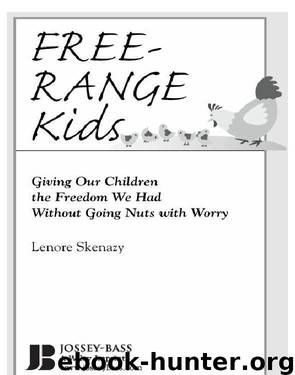Free-Range Kids by Skenazy Lenore

Author:Skenazy, Lenore [Skenazy, Lenore]
Language: eng
Format: mobi
Publisher: Wiley
Published: 0101-01-01T00:00:00+00:00
It is only in the last century or so that we started to believe that parenting, especially during the first few years of life, determines how a child turns out. A survey of Parisian moms back in 1780 found that 95 percent of them farmed their babies out to wet nurses—that is, to other women who would take in their babies and breastfeed them until the parents picked them up when they were weaned. Oftentimes, the moms didn’t even visit very much. The idea that that first year was a crucial time for a child’s intellectual development (not to mention bonding) was unheard of. For most of human history, parents believed a baby needed milk and a place to sleep, not, as many of us believe today, board books, soft books, story tapes, light-up rattles, and musical mobiles playing Mozart. Even Mozart didn’t grow up hearing Mozart. (But his kids did, and whoever heard of them?)
Then along came Freud, who delved deep into childhood memories and found the root of a lot of our adult “issues” buried there. Freud revolutionized the way we look at parenting, because he saw children as blank pages that parents could, however unintentionally, scribble all over and crumple and tear and then, for good measure, use to wipe up spills. Or at least that is how his ideas have filtered down to pop culture.
Freud was a genius—who could deny his idea of the unconscious? Even unconsciously? But his theories had the unforeseen consequence of making parents very worried that a harsh word, a lack of encouragement, or even the opposite—extra-high hopes—could cause a child a lifetime of resentment and pain. It made parenting seem like a completely daunting, almost unnatural act. You had to be on guard all the time, lest you accidentally squash the emerging psyche.
These days, we buy into two basic assumptions. One, that children are wet clay at birth and dry out pretty fast, so we’d better sculpt them into something really good, really fast, or we’ll be left with a lump. And two, that for some reason our children need more attention than any other generation, ever, if they are going to end up smart, well adjusted, and successful.
Let’s examine the early childhood assumption first.
“If neuroscience has taught us anything, it’s that people are resilient and they can learn across the life span,” says John Bruer, president of the James S. McDonnell Foundation and author of The Myth of the First Three Years. Although a little baby is indeed ready to learn language and expressions and how the world works, that does not mean it needs to have everything crammed into its cranium before the gate slams shut at age four. So when parents worry that they’d better teach their kids the alphabet or their colors or any of the info you can find on, ugh, a Baby Einstein educational placemat (lest your child waste crucial learning minutes idly waiting for his Cheerios), that’s just wrong.
“There’s this crazy notion that we
Download
This site does not store any files on its server. We only index and link to content provided by other sites. Please contact the content providers to delete copyright contents if any and email us, we'll remove relevant links or contents immediately.
The Lost Art of Listening by Michael P. Nichols(7506)
Rich Dad Poor Dad by Robert T. Kiyosaki(6632)
We Need to Talk by Celeste Headlee(5615)
I Love You But I Don't Trust You by Mira Kirshenbaum(3875)
The Complete Idiot's Guide to Coping With Difficult People by Arlene Uhl(3149)
Rich Dad Poor Dad: What The Rich Teach Their Kids About Money - That The Poor And Middle Class Do Not! by Robert T. Kiyosaki(2958)
A Burst of Light by Audre Lorde(2607)
The Book You Wish Your Parents Had Read (and Your Children Will Be Glad That You Did) by Philippa Perry(2528)
Dealing with People You Can't Stand by Dr. Rick Brinkman(2458)
Life Hacks by Dan Marshall(2456)
An Odyssey by Daniel Mendelsohn(2307)
The Expectant Father by Armin A. Brott & Jennifer Ash(2270)
Teach Your Child How to Think by Edward De Bono(2159)
No Time to Say Goodbye(2116)
What I Need by J. Daniels(2081)
The 7 Habits Of Highly Effective Teens by Covey Sean(2080)
The Out-of-Sync Child by Carol Stock Kranowitz(2054)
The Anxious Generation by Jonathan Haidt(2046)
I Don't Belong to You by Keke Palmer(2005)
